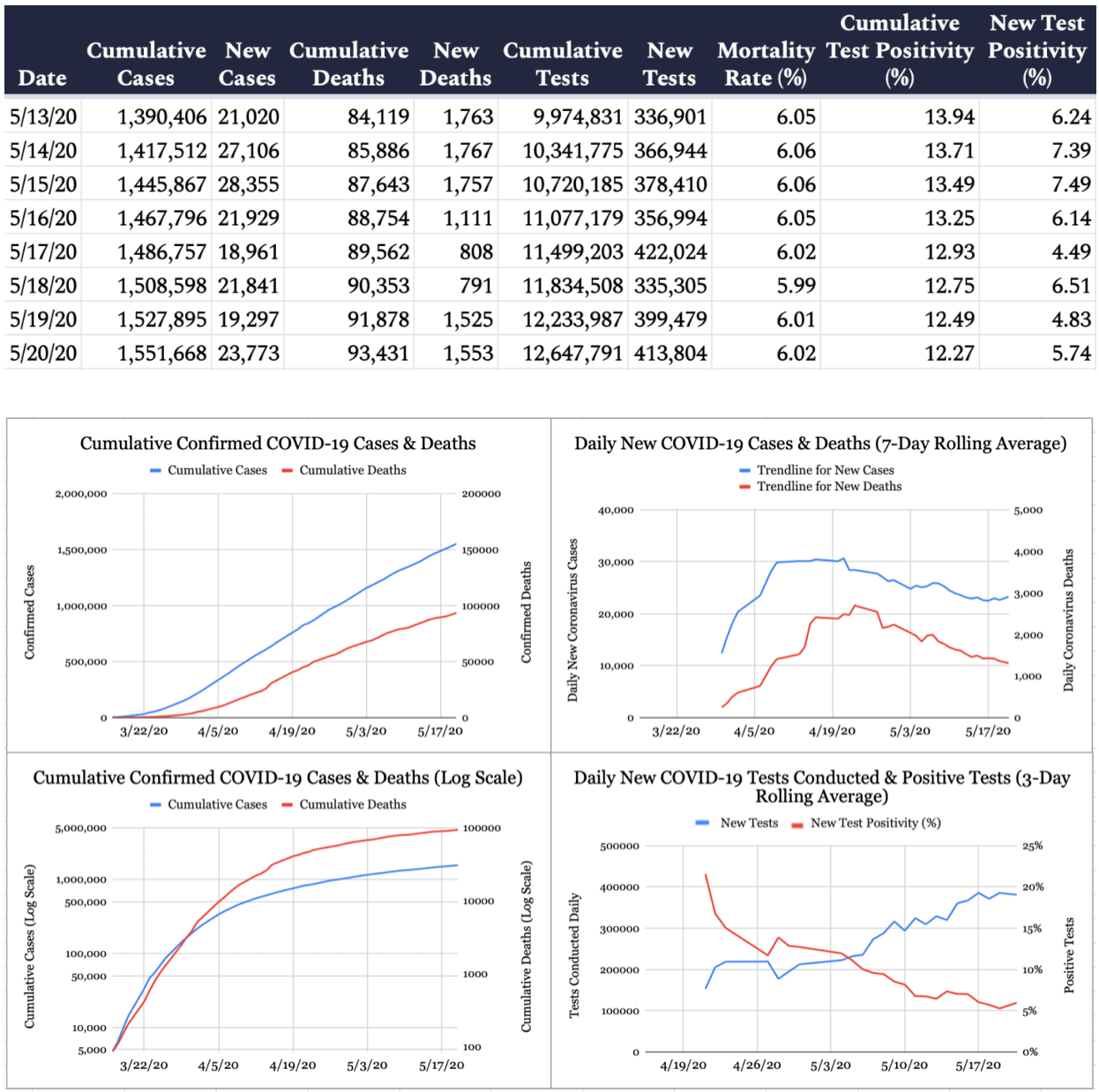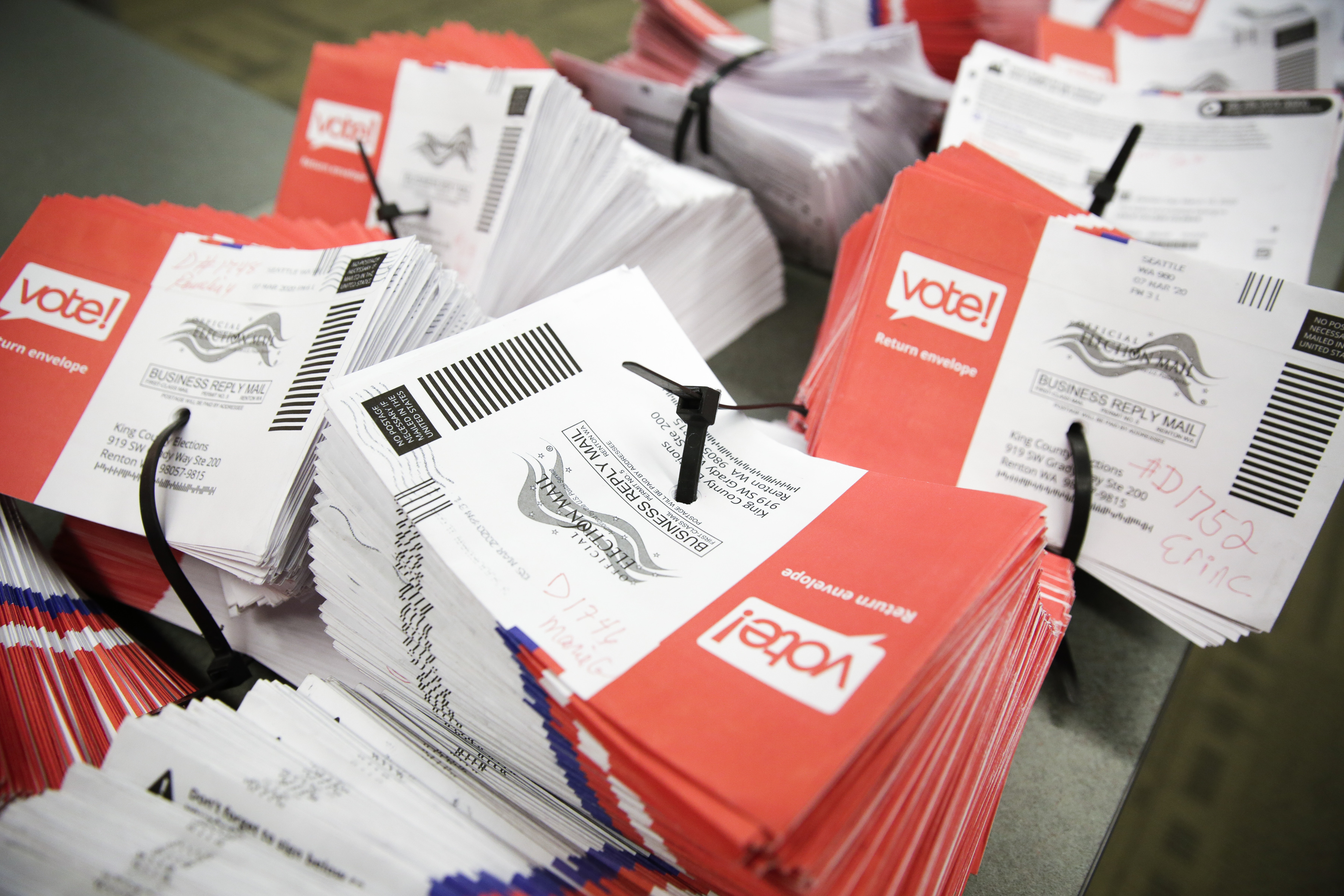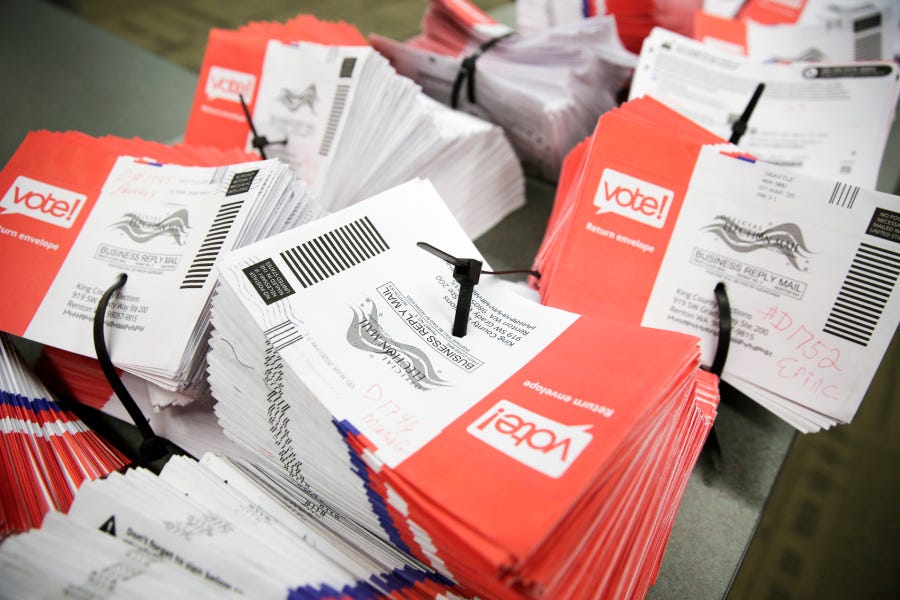Happy Thursday! And happy National Strawberries and Cream Day! Don’t ask us why this is a thing, or why it is held on May 21; we do not know. But celebrate responsibly!
Quick Hits: Today’s Top Stories
-
As of Wednesday night, 1,551,668 cases of COVID-19 have been reported in the United States (an increase of 23,773 from yesterday) and 93,431 deaths have been attributed to the virus (an increase of 1,553 from yesterday), according to the Johns Hopkins University COVID-19 Dashboard, leading to a mortality rate among confirmed cases of 6 percent (the true mortality rate is likely lower, but it’s impossible to determine precisely due to incomplete testing regimens). Of 12,647,791 coronavirus tests conducted in the United States (413,804 conducted since yesterday), 12.3 percent have come back positive.

-
U.S. attitudes toward China have soured substantially over the course of the coronavirus crisis, according to a new Politico/Morning Consult poll: 31 percent of voters now say China is an “enemy,” an increase of 11 percentage points from January, while the share who describe China as an “ally” or a “friend” has fallen from 32 percent to 23 percent.
-
Planned Parenthood is facing scrutiny after revelations that 37 of its affiliates applied for and received a combined $80 million in Paycheck Protection Program loans despite being ineligible for the program under the terms of the law.
-
Several towns in central Michigan were forced to evacuate Wednesday after the failure of two river dams led to widespread, potentially life-threatening flooding.
-
Secretary of State Mike Pompeo defended his decision to recommend Inspector General Steve Linick be fired, telling reporters yesterday that “claims that this was retaliation for some investigation” are “patently false.”
-
The Supreme Court temporarily blocked the release of grand jury material from the Mueller report on Wednesday.
You’ve Got Mail-In Ballots

On Tuesday morning, President Trump threatened to withhold funding from Nevada and Michigan for what he claimed were illegal efforts to encourage absentee and mail-in voting.
The response, from Nevada Gov. Steve Sisolak, a Democrat: “Nevada is widely recognized as being a national leader in election administration, and we will continue to support the safest, most accessible election possible under these unprecedented circumstances.” He added: “For the President to threaten federal funding in the midst of a pandemic over a state exercising its authority to run elections in a safe and legal manner is inappropriate and outrageous.”
Michigan Secretary of State Jocelyn Benson also responded, “Every Michigan registered voter has a right to vote by mail. I have the authority & responsibility to make sure that they know how to exercise this right – just like my GOP colleagues are doing in GA, IA, NE and WV.”
Lawsuits are already heating up on the issue as well. The Texas Supreme Court heard arguments on Wednesday to determine whether a fear of contracting COVID-19 at the polls should qualify as a disability under the law, which would allow a Texas voter to receive an absentee ballot. That same afternoon, a federal appellate court in Texas weighed in on the dispute, blocking a lower court order that would have allowed much broader absentee voting in the state.
What is not clear, however, is whether attacking states trying to expand vote-by-mail operations is a politically savvy strategy by Republicans.
As Rachel Kleinfeld, a senior fellow in the Democracy, Conflict, and Governance program at the Carnegie Endowment, noted in an article she wrote for The Dispatch last month:
The biggest demographic who vote by mail are the elderly, who tend to vote Republican. They are also the most likely to be scared away from the polls by COVID-19. However, studies of vote by mail in Colorado and Utah found increased turnout from the young, the very old, and nonvoters, benefitting, on the whole, no party in particular.
In the meantime, Pennsylvania has a primary next month and has seen a 14-fold increase in requests for absentee ballots over 2016. And this comes at a time when Trump’s popularity with senior citizens is taking a nosedive. As Sarah wrote a few weeks back, “When shutdown measures began in earnest on March 16, Morning Consult polling showed Trump with a net +19 point approval advantage with older Americans—higher than any other age cohort—but in just a month, that number has dropped a head-turning 20 points.”
And as to the specific threat the president made about withholding funding from states that expand mail-in voting? Washington election lawyer Jan Baran, a former general counsel for the Republican National Committee, told the Las Vegas Review-Journal, “I have no idea what Trump means, and perhaps he doesn’t either. Withhold which funds? How much? On what basis can funds be withheld if they have been authorized and appropriated by Congress?”
When Trump was asked about these tweets later in the day, he appeared to backtrack a bit on withholding funding: “They’ll be finding out very soon if it’s necessary, I don’t think it’s going to be necessary.”
House Republicans Formed a China Task Force. Is It up to the Task?
Earlier this month, House Minority Leader Kevin McCarthy announced the creation of what he called the China Task Force. “We will be looking at a broad range of China-related issues,” the California Republican said in a statement on May 7. “Influence operations targeting the U.S., the economic threat to our government and allies, efforts to gain the technological advantage, and China’s role in the origin and spread of COVID-19.”
Declan talked to several members of the 15-person task force, and, in a piece for the site, explored the politics of the group, what it can actually accomplish, and where our relationship with China is headed more broadly.
Is the task force bipartisan?
No, but it was supposed to be. Michele Perez Exner, a spokeswoman for McCarthy, told The Dispatch the original plan, first outlined in April 2019, would have involved an equal number of Republicans and Democrats—but the Democrats backed out in late February.
Exner said the door remains open for Democrats to play a role, and that McCarthy “wants to run [the task force] as though it was a bipartisan entity.” At least for now, concern over Chinese influence cuts across party lines: A Pew Research Center poll conducted in March found 72 percent of Republicans and 62 percent of Democrats hold unfavorable opinions of China, both record highs since Pew began tracking the sentiment in 2005.
“When you’re just talking about the policy and the substance of it, you might be hard pressed to find another issue on which there is as much bipartisan support,” Rep. Liz Cheney said on needing to protect against Chinese hostility. In an interview with The Dispatch on Tuesday, Cheney—Republican Conference chairwoman and a member of the task force—suggested politics got in the way of Democratic participation. “I think Speaker Pelosi believes that if she is suggesting that we hold China accountable, that somehow then she’s not blaming President Trump. I think she views it as a zero-sum game.”
What will it actually accomplish?
Some say not much—for now. “The House Republicans can’t do anything other than posture. And I’m not blaming them for that. I’m just saying that’s the story,” Derek Scissors, a China expert at the American Enterprise Institute, told The Dispatch. “The number one goal I would have for the House Republican task force is they be the idea supplier. They marry up with somebody who will actually do something, because they can’t.”
Members of the task force, of course, view their involvement as far more than political posturing. “I don’t get involved in things like this if I don’t think it’s going to do anything,” Rep. Adam Kinzinger said. He sees the group’s role as not only pushing ideas, but legislation to accompany them. “Even if what we put out is not adopted under this current construct of government, I think it’ll play kind of a long-term game in terms of how … we formulate our response from a legislative perspective.”
“It may take 10 years to implement some of these things, but I think it’ll make a big difference,” he added. “Especially when you have changing presidents every four or eight years.”
Cheney said some of these proposals could make it into the next National Defense Authorization Act (NDAA), an annual must-pass piece of legislation that funds the Department of Defense. “Issues like obviously Huawei, pharmaceutical supply chains for our service members, sort of a broad range of issues. I think you probably will see those in the NDAA,” she said. “It’s going to be difficult for anybody—no matter your party—to say, ‘No, we’re not going to hold the Chinese Communist Party accountable for this.’”
How are they thinking about their role vis-a-vis the pandemic?
One of the most pressing issues, Scissors, Cheney, and Kinzinger agree, is reconfiguring aspects of the supply chain for key coronavirus-related medicines and products.
“I think the coronavirus, as much as anything, it’s just highlighted the problems that people didn’t widely see,” Kinzinger said, referencing exposure in pharmaceutical and personal protective equipment (PPE) supply chains. “Let’s say there’s 25 supply chain vulnerabilities, and we need to pick the top five or 10 that are most important to us and make sure that we have that sourced either here or in … Australia, Britain, Canada, kind of close allies.”
But disentangling the production of these products from China will be a monumental task.
“What if we were making the PPE here, but the textiles that go into the products themselves came from China?” Scissors asked. “There’s a big political debate that everyone can participate in about who do we trust for what goods, what goods are really important, and so on. But once you do that, someone has to then say, ‘Well wait a minute. This production you have in the U.S. is just the final good.” It’s complicated, Scissors says, if we’re still relying on these people, who in turn rely on the Chinese.
There are differing schools of thought among analysts and policymakers regarding how best to bring about this targeted onshoring. Should the United States dangle tax incentives and other benefits (a carrot), or punish businesses that refuse to comply (a stick)?
“It’s a stick. It’s absolutely a stick,” Scissors argued. “You can’t out-subsidize the Chinese. … If you offer tax incentives, and the Chinese want to keep the production because it’s something they think is critical, or they want to deny it to us because we think it’s critical, whatever—they’ll just offer more money!”
Instead, he says, the United States should mandate that—for certain products—companies cannot supply the United State from China. “They’re going to scream bloody murder,” Scissors said of these manufacturers. “And it’s too bad. I don’t want to do this for 150 products.”
Policymakers were more nuanced—but not much. “I think the hope is to start with carrots, and incentives, and opportunities, and hope that patriotism wins the day,” Kinzinger said, “but realizing that that’s not always going to be the case. Then it may take a little bit of a stick.”
“I think you have to do both,” Cheney argued, adding that there will be some medicines and products the United States determines must be capable of being produced entirely domestically. “Some supply chains can be obviously in countries that are allies of ours. But I think that there will be certain critical needs that we know we can’t count on anybody else and we’ll have to produce here, and I think that will require prohibitions and mandates.”
Worth Your Time
-
With the economy reopening and evidence mounting that the coronavirus spreads much more dangerously indoors than out, our nightmarish fears that the nation would be spending the summer cooped up out of the sunshine have largely dissipated. But beating the heat will remain a tricky prospect. In this piece for The Atlantic, Olga Khazan walks through the COVID-era swimming pool situation: “Even in areas where public pools do open this summer, swimmers may have a very different pool experience than they’re used to. For the time being, a pool day might feel less like a mini-vacation and more like a weird exercise class, complete with masks.”
-
It’s become a regular, almost totemic part of many of our lives: You spend the majority of your waking hours submerged in the hyperstimulating, attention-demanding world of apps and screens, and every few months or so you read some stern article or book reminding you that it’s probably killing you in six or seven different ways. This 1843 Magazine piece by Tom Lamont is one of those articles, but it’s much more than that too: an engrossing account of a British artist named Sam Winston who decided to spend a month alone in complete darkness.
-
Hear us out: “11,000 words about the classic ’90s PC game SimCity’s less well-known, business-class successor, SimRefinery.” If that doesn’t sound like a recipe for a good time to you, think again: Over at The Obscuritory, a blog about old games that we’d never previously heard of, Phil Salvador has spent four years working on this exhaustively reported, endlessly fascinating piece about Maxis Business Simulations and a bizarre moment in the development of tech, when the overnight boom of sim games made enormous multinational corporations like Chevron prick up their ears and say: “Hey, couldn’t we use something like this to train our employees?” Go give it a read.
Presented Without Comment: Make It Stop Edition
Toeing the Company Line
-
Tom Joscelyn’s most recent Vital Interests newsletter (🔒) is a particularly strong one, walking us through this week’s breakthrough in the investigation into last December’s terrorist attack at Naval Air Station Pensacola, which left three U.S. sailors dead and eight other Americans wounded. After four months of effort, FBI investigators finally broke into the iPhone belonging to the shooter, Mohammed Saeed Alshamari, which permitted them to answer the biggest major outstanding question about the attack: Alshamrani was not only inspired by al-Qaeda, he was actively working for them all along. Joscelyn walks through all the details and ramifications for both national security and the debate about whether the government should compel Apple to build a “backdoor” into its devices for law enforcement purposes.
-
The latest Dispatch Podcast is out, and features a lively discussion of unemployment benefits, the firing of the State Department’s inspector general, the recently declassified email from Susan Rice, and Joe Biden’s best prospective VP picks.
-
We could try to write up a blurb for Jonah’s midweek G-File (🔒), but anything we say here would fail spectacularly to capture its essence. Just go read it here.
-
Stimulus money going to deep-pocketed prep schools with sizable endowments has generated controversy. But Rick Hess and Brendan Bell point out that many of the nation’s private K-12 schools, many of which charge a few thousand dollars a year in tuition, are genuinely struggling.
-
On the site today, Danielle Pletka looks at the problem of foreign companies that behave badly but are still listed on the major U.S. stock exchanges or that are otherwise available as over-the-counter securities.
Let Us Know
Back, by popular demand: Dispatch Live! Sarah, Steve, Jonah, and David will be live streaming a podcast TONIGHT at 8 p.m. ET. Members can (and should!) register here. Our question for you: What the heck should they talk about? Let us know either in the comments below, or shoot us a note at replies@thedispatch.com. See you tonight!
Reporting by Declan Garvey (@declanpgarvey), Andrew Egger (@EggerDC), Sarah Isgur (@whignewtons), Alec Dent (@Alec_Dent), and Steve Hayes (@stephenfhayes).
Photograph by Photo by Jason Redmond/AFP/Getty Images.






Please note that we at The Dispatch hold ourselves, our work, and our commenters to a higher standard than other places on the internet. We welcome comments that foster genuine debate or discussion—including comments critical of us or our work—but responses that include ad hominem attacks on fellow Dispatch members or are intended to stoke fear and anger may be moderated.
You are currently using a limited time guest pass and do not have access to commenting. Consider subscribing to join the conversation.
With your membership, you only have the ability to comment on The Morning Dispatch articles. Consider upgrading to join the conversation everywhere.